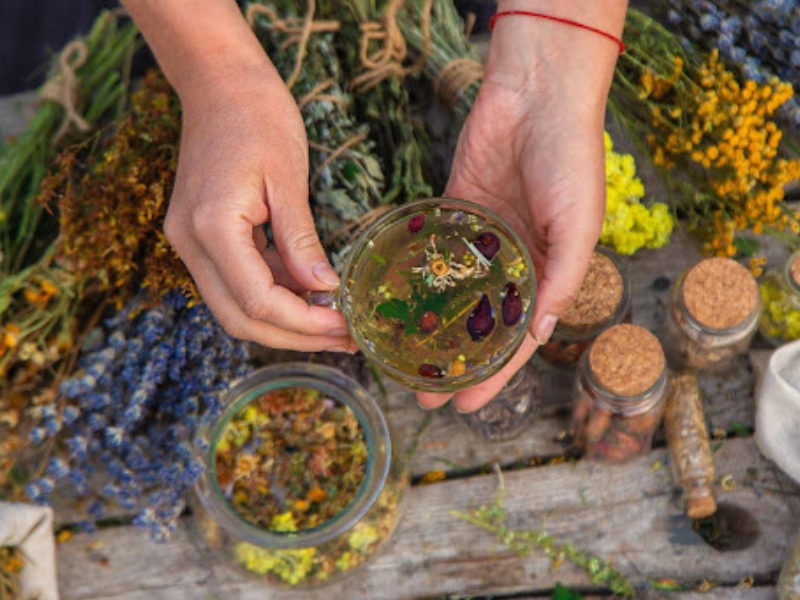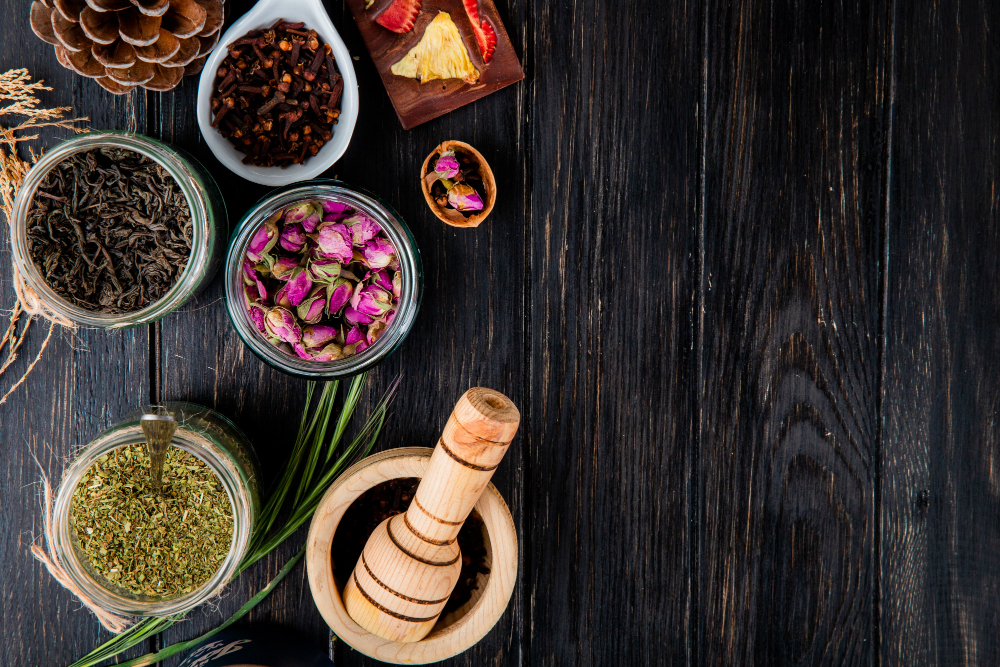
Embracing Nature: Herbal Treatments for Menopause Relief
Entering menopause is like stepping into a new session of life- one marked by freedom, growth, and for many, some unique challenges. While menopause represents the natural culmination of a woman’s reproductive journey, it is often accompanied by symptoms like hot flashes, mood swings, and sleepless nights that can make this time more demanding than delightful.
But there’s good news: thanks to the ancient healers who knew the traditional practices of using herbs to cure many diseases with ease. Such folklore practices provide us with a different angle to look for the wealth of gentle and effective solutions that have been used for centuries to help ease this hormonal transition.
If reports and traditional knowledge are to be believed, herbal remedies for menopausal symptoms are becoming increasingly popular, and women everywhere are discovering the calming and restorative potential of botanicals. These natural allies offer a beautiful and empowering way to address the root causes of menopausal discomforts without the use of synthetic hormones.
Navigating Menopause and Its Symptoms
For most women, menopause is an inevitable rite of passage that occurs between the ages of 45 and 55, though it can happen sooner or later depending on the lifestyle you are having. This phase signals the end of monthly cycles and brings about a gradual decline in hormones, especially estrogen.

As estrogen levels dip, a variety of troublesome symptoms arise including:
- Hot Flushes and Night Sweats: Those sudden waves of heat that turn into a sweaty glow, often at the most inconvenient moments.
- Mood Swings and Irritability: Hormonal changes can leave you feeling emotionally unsteady.
- Sleeplessness: Slumping estrogen triggers the sleep cycle badly which turns into insomnia.
- Cognitive Symptoms: While going through this phase, experienced women also report forgetfulness and reduced concentration, called “brain fog”.
For maintaining the well-being of women’s midlife and to alleviate the symptoms arising due to hormonal deficiency and imbalance, hormone replacement therapy (HRT) is a gold standard to counter them in symptomatic women.
However, according to WHI (Women’s Health Initiative), hormonal therapy is suspected to increase health risks including uterine, ovarian, endometrial, and breast cancer, coronary heart disease, and pulmonary embolism by 2.3%. This leads many women to turn to herbal treatments for menopausal symptoms as it is a natural, side-effect-free alternative. From cooling hot flushes to soothing mood swings, these remedies offer a holistic approach to managing symptoms and nurturing wellness.
Herbal Remedies for Menopause: Nature’s Soothing Botanicals
Drawing on centuries of traditional wisdom and bolstered by modern research, the herbal allies provide a natural, effective path to balance and comfort during menopause. Here are some most potent herbs for navigating this journey:
1. Red Clover (Trifolium Pratense)
A herb, commonly found in pastureland, is called a plant-based estrogen source. It is rich in isoflavones, a kind of secondary metabolite with structural and functional similarity with estrogen. Studies suggest that red clover can help stabilize estrogen levels, providing relief from hot flushes while also potentially improving bone density- a crucial benefit as women age.
- Directions to Use: This herb is available in the form of tea, capsule, or tincture in the market.
- Precautions: As red clover can have mild blood thinning effects; it is best to consult a healthcare provider if you are taking anticoagulants.
2. Black cohosh (Cimicifuga Racemosa)
It is a trusted ally for hot flushes and is one of the most well-known herbal remedies for menopausal symptoms, particularly for hot flushes and night sweats. Since the herb is native to North America, it has been used by Indigenous communities for centuries to support women’s reproductive health. The compounds present in this herb mimic estrogen and help cool down those “hot moments” and ease the night sweats.
- Directions to Use: Crude or raw parts of this herb are not easy to find and therefore, are available in capsules, tablets, and tinctures with the mentioned dose to be consumed.
- Precautions: Although well tolerated, women with liver conditions should use black cohosh cautiously.
3. Licorice (Glycyrrhiza Glabra)
Mulethi or Yashtimadhu roots are more than just a sweet-tasting treat. It is a powerful adaptogen and natural hormone balancer often used to relieve menopausal symptoms like hot flashes, mood swings, and fatigue. Licorice contains estrogenic compounds that help maintain declining hormone levels and ease symptoms of menopause. Moreover, its anti-inflammatory and antioxidant properties can soothe the body, making it a valuable ally for women seeking hormonal harmony.
- Directions to Use: The roots are available as tea, capsules, tablets, tinctures, and spices.
- Precautions: It should be cautiously used by individuals with high blood pressure, as it can increase sodium retention and raise blood pressure when used in high doses.
4. St. John’s Wort (Hypericum Perforatum)
For women experiencing emotional upheavals during menopause, this herb offers a natural lift. Traditionally, it is used as an herbal remedy for mood imbalances, reducing depression and making it an ally for the emotional changes that often accompany menopause.
- Directions to Use: Available in capsules, tablets, and tea.
- Precautions: It should be taken after a consultation with a healthcare provider as the compounds in this herb are psychoactive.
5. Shatavari (Asparagus Racemosus)
Sometimes it is designated as a queen of women’s herbs. A revered herb in Ayurveda, Shatavari is known for nourishing and rejuvenating effects on women’s health before and after menopause. It reduces menopausal symptoms like hot flushes, and dryness and supports estrogen production, making it a go-to herb for comfort and balance during menopause.
- Directions to Use: Shatavari is available in powder, capsules, tablets, and liquid extract forms with the prescribed dosage.
- Precautions: It is generally safe for most women but may not be suitable for those with estrogen-sensitive sensitive conditions.
6. Brahmi (Bacopa Monnieri)
In Ayurveda, it is considered a powerful herb for mental health, memory, and stress resilience. It helps reduce anxiety, improve concentration, and balance mood- a common challenge for many women experiencing menopause.
- Directions to Use: Brahmi is available as powder, capsule, and liquid extracts. Sometimes, it is also eaten just by boiling.
- Precautions: Usually it is safe, but it may have a sedative effect for some. Therefore, it must be taken after consultation with your healthcare providers.
Why to Choose Herbal Remedies for Menopause?

Choosing herbal remedies for menopause offers a refreshing, natural approach to managing its wide range of symptoms. Imagine a soothing cup of sage tea to reduce hot flushes, or a calming tincture of St. John wort to ease anxiety and improve sleep.
These plant-based solutions work with the body, often providing relief without the synthetic hormones or potential side effects associated with other treatments.
They are gentle yet powerful, bringing women a sense of control over their bodies by helping balance hormones naturally.
What Makes the Botanical Allies Medicinal?
Botanical allies or medicinal plants possess unique compounds that give them powerful therapeutic qualities. These natural substances, including flavonoids, polyphenols, alkaloids, and terpenes are the secondary metabolites that plants use for their protection against predators, infection, and environmental stress.
The good thing is that such compounds have therapeutic effects, they work in synergy with their complex mix often more effective in whole rather than when isolated.
This natural synergy allows them to provide broad support for multiple body systems, making them versatile allies in promoting balance and resilience.
Possible Potential Risk of Having Herbs: Breaking the Superstition
While the herbs offer a wealth of health benefits during menopause, they are not without risk-especially when used without the right knowledge. The “natural” word should never be misunderstood as “harmless”, because herbs contain various active compounds that can interact with our bodies in significant, sometimes adverse ways especially when hormones are involved and if not taken in a regulated manner. Here are some potential risks associated with menopausal symptoms that you should know:
- While the popular herbs as mentioned above can help alleviate menopausal symptoms, they may cause hormonal imbalances if taken for extended periods or in high doses, especially for those with hormone-sensitive conditions, like breast cancer or endometriosis.
- If you are taking herbal medicine in any form, it must be considered “medicine” so it has a precise dose, an accurate period, and a specific time to consume. Taking it casually may lead to liver toxicity, so you must consult a healthcare provider.
- If you are on medication for other problems like blood pressure, hypertension, and so forth and want herbal supplements for managing menopausal symptoms, be cautious! The active compounds of herbs may interact with medications (synthetic drugs) you are already taking which may reduce the effectiveness of the drugs.
- With the increasing demand for herbal products instead of their fewer side effects, the admixture and contaminations of herbs are also increasing. Choosing high-quality, well-sourced herbs is crucial to minimize the risk.
Embracing a Holistic Approach to Menopause
Herbal therapy shines brightest when combined with a balanced lifestyle that nurtures mind, body, and soul. Incorporating these simple yet powerful habits can make a profound difference:
- Nourishing Food: A diet rich in calcium, magnesium, and omega-3, green veggies, lentils, nuts, and seeds can support bone health, and emotional stability and ease inflammation.
- Gentle Movement: Yoga, walking, and resistance exercises help maintain muscle and bone strength while promoting relaxation and mood balance.
- Mindful Stress Relief: Practices like meditation, deep breathing, and journaling can reduce stress factors that can heighten menopause symptoms.
Core Takeaway
Menopause is a transformative time- a closing chapter, yes, but also a new beginning full of wisdom and strength. For women seeking a natural path through the changes it brings, herbal treatments for menopause symptoms provide gentle, effective support for both body and mind.
From taming the heat, elevating the energy, boosting the mood, and lifting the spirit, the herbs allow you to harmonize with nature’s rhythm, embracing the beauty of every season. Therefore, by connecting with herbal wisdom and treating menopause as a holistic journey, each woman can find her path to balance, resilience, and radiant health.
Citations
- https://pubmed.ncbi.nlm.nih.gov/37921699/
- https://www.nhs.uk/medicines/hormone-replacement-therapy-hrt/alternatives-to-hormone-replacement-therapy-hrt/herbal-remedies-and-complementary-medicines-for-menopause-symptoms/
- https://www.healthline.com/nutrition/menopause-herbs
- https://www.menopausecliniclondon.co.uk/non-hrt-alternatives

Poonam Rawat





